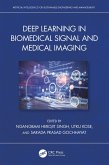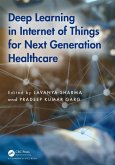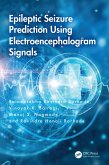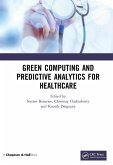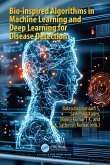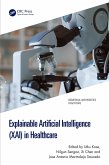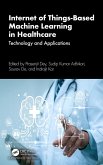Deep Learning in Biomedical Signal and Medical Imaging (eBook, PDF)
Redaktion: Singh, Ngangbam Herojit; Gochhayat, Sarada Prasad; Kose, Utku
52,95 €
52,95 €
inkl. MwSt.
Sofort per Download lieferbar

26 °P sammeln
52,95 €
Als Download kaufen

52,95 €
inkl. MwSt.
Sofort per Download lieferbar

26 °P sammeln
Jetzt verschenken
Alle Infos zum eBook verschenken
52,95 €
inkl. MwSt.
Sofort per Download lieferbar
Alle Infos zum eBook verschenken

26 °P sammeln
Deep Learning in Biomedical Signal and Medical Imaging (eBook, PDF)
Redaktion: Singh, Ngangbam Herojit; Gochhayat, Sarada Prasad; Kose, Utku
- Format: PDF
- Merkliste
- Auf die Merkliste
- Bewerten Bewerten
- Teilen
- Produkt teilen
- Produkterinnerung
- Produkterinnerung

Bitte loggen Sie sich zunächst in Ihr Kundenkonto ein oder registrieren Sie sich bei
bücher.de, um das eBook-Abo tolino select nutzen zu können.
Hier können Sie sich einloggen
Hier können Sie sich einloggen
Sie sind bereits eingeloggt. Klicken Sie auf 2. tolino select Abo, um fortzufahren.

Bitte loggen Sie sich zunächst in Ihr Kundenkonto ein oder registrieren Sie sich bei bücher.de, um das eBook-Abo tolino select nutzen zu können.
This book offers detailed information on biomedical imaging using Deep Convolutional Neural Networks (Deep CNN). It focuses on different types of biomedical images to enable readers to understand the effectiveness and the potential. It includes topics such as disease diagnosis, and image processing perspectives.
- Geräte: PC
- mit Kopierschutz
- eBook Hilfe
Andere Kunden interessierten sich auch für
![Deep Learning in Biomedical Signal and Medical Imaging (eBook, ePUB) Deep Learning in Biomedical Signal and Medical Imaging (eBook, ePUB)]() Deep Learning in Biomedical Signal and Medical Imaging (eBook, ePUB)52,95 €
Deep Learning in Biomedical Signal and Medical Imaging (eBook, ePUB)52,95 €![Deep Learning in Internet of Things for Next Generation Healthcare (eBook, PDF) Deep Learning in Internet of Things for Next Generation Healthcare (eBook, PDF)]() Deep Learning in Internet of Things for Next Generation Healthcare (eBook, PDF)52,95 €
Deep Learning in Internet of Things for Next Generation Healthcare (eBook, PDF)52,95 €![Epileptic Seizure Prediction Using Electroencephalogram Signals (eBook, PDF) Epileptic Seizure Prediction Using Electroencephalogram Signals (eBook, PDF)]() Ratnaprabha Ravindra BorhadeEpileptic Seizure Prediction Using Electroencephalogram Signals (eBook, PDF)52,95 €
Ratnaprabha Ravindra BorhadeEpileptic Seizure Prediction Using Electroencephalogram Signals (eBook, PDF)52,95 €![Green Computing and Predictive Analytics for Healthcare (eBook, PDF) Green Computing and Predictive Analytics for Healthcare (eBook, PDF)]() Green Computing and Predictive Analytics for Healthcare (eBook, PDF)46,95 €
Green Computing and Predictive Analytics for Healthcare (eBook, PDF)46,95 €![Bio-inspired Algorithms in Machine Learning and Deep Learning for Disease Detection (eBook, PDF) Bio-inspired Algorithms in Machine Learning and Deep Learning for Disease Detection (eBook, PDF)]() Bio-inspired Algorithms in Machine Learning and Deep Learning for Disease Detection (eBook, PDF)52,95 €
Bio-inspired Algorithms in Machine Learning and Deep Learning for Disease Detection (eBook, PDF)52,95 €![Explainable Artificial Intelligence (XAI) in Healthcare (eBook, PDF) Explainable Artificial Intelligence (XAI) in Healthcare (eBook, PDF)]() Explainable Artificial Intelligence (XAI) in Healthcare (eBook, PDF)115,95 €
Explainable Artificial Intelligence (XAI) in Healthcare (eBook, PDF)115,95 €![Internet of Things-Based Machine Learning in Healthcare (eBook, PDF) Internet of Things-Based Machine Learning in Healthcare (eBook, PDF)]() Internet of Things-Based Machine Learning in Healthcare (eBook, PDF)52,95 €
Internet of Things-Based Machine Learning in Healthcare (eBook, PDF)52,95 €-
-
-
This book offers detailed information on biomedical imaging using Deep Convolutional Neural Networks (Deep CNN). It focuses on different types of biomedical images to enable readers to understand the effectiveness and the potential. It includes topics such as disease diagnosis, and image processing perspectives.
Dieser Download kann aus rechtlichen Gründen nur mit Rechnungsadresse in A, B, BG, CY, CZ, D, DK, EW, E, FIN, F, GR, HR, H, IRL, I, LT, L, LR, M, NL, PL, P, R, S, SLO, SK ausgeliefert werden.
Produktdetails
- Produktdetails
- Verlag: Taylor & Francis eBooks
- Seitenzahl: 274
- Erscheinungstermin: 30. September 2024
- Englisch
- ISBN-13: 9781040107119
- Artikelnr.: 72284558
- Verlag: Taylor & Francis eBooks
- Seitenzahl: 274
- Erscheinungstermin: 30. September 2024
- Englisch
- ISBN-13: 9781040107119
- Artikelnr.: 72284558
- Herstellerkennzeichnung Die Herstellerinformationen sind derzeit nicht verfügbar.
Ngangbam Herojit Singh is presently working as an Assistant Professor at NIT Agartala in the Department of Computer Science and Engineering. He received his Ph.D. degree from the NIT Manipur, and M.Tech and B.Tech from Anna University, Chennai. His area of interest includes machine learning, biomedical image processing, hybrid intelligent system, and mobile robotics. He has published more than 12 referred journals, including SCI and Scopus-indexed journals. Furthermore, he has published many conference papers and book chapters. Dr. Herojit has participated in many international conferences as an organizer and session chair. Utku Kose received a B.S. degree in 2008 in computer education from Gazi University, Turkey, as a faculty valedictorian; an M.S. degree in 2010 from Afyon Kocatepe University, Turkey, in the field of computer; and a D.S. / Ph. D. degree in 2017 from Selcuk University, Turkey, in the field of computer engineering. Between 2009 and 2011, he worked as a research assistant at Afyon Kocatepe University. Furthermore, he has also worked as a lecturer and vocational school vice director at Afyon Kocatepe University between 2011 and 2012, as a lecturer and research center director at Usak University between 2012 and 2017, and as an assistant professor at Suleyman Demirel University between 2017 and 2019. Currently, he is an Associate Professor at Suleyman Demirel University, Turkey. He has to his credit more than 200 publications, including articles, authored and edited books, proceedings, and reports. He is also on the editorial boards of many scientific journals and serves as one of the editors of the Biomedical and Robotics Healthcare (CRC Press) book series. His research interest includes artificial intelligence, machine ethics, artificial intelligence safety, biomedical applications, optimization, chaos theory, distance education, e-learning, computer education, and computer science. Sarada Prasad Gochhayat is currently working as an assistant teaching professor at Villanova University, Philadelphia, USA. He has earned his Ph.D. degree in communication engineering from IISc Bangalore, M. Tech. in Signal Processing from IIT Guwahati, and B. Tech. in ECE from ITER, SOA University, Bhubaneswar. He has past working experience as a faculty member at Manipal University, India, and Old Dominion University, Virginia, USA; post-doctoral research experience at the University of Padua, Italy; and Virginia Modeling, Analysis and Simulation Center, Virginia, USA. His research interests include blockchain, privacy in cloud computing, privacy-preserving data analytics, security and privacy in healthcare systems, and security in IoT and 5G networks.
1. Detection of Diabetic Retinopathy from retinal fundus images by using
CNN Model ResNet-50.
2. DNASNet-RF: Automated Deep NAS-network with Random Forest for
Classifying and Detecting Multi-class Brain Tumor. 3. Deep CNNs in
image-guided diagnosis of breast and skin cancers. 4. Robust Learning
Principle Design to Detect Diabetic Retinopathy Disease in Early Stages
with Skilled Feature Extraction Policy. 5. Liver Tumour Detection using
Machine Learning Techniques: A Systematic Review. 6. Deep Learning in
Photoacoustic Tomographic Image Reconstruction. 7. Design and Development
of Computer Aided Diagnosis to Detect Lung Cancer Disease by Using
Intelligent Deep Learning Principle. 8. Novel Methodology to Predict and
Classify Liver Diseases Based on Hybrid Deep Learning Strategy. 9.
Improvements in Analysing Biomedical Signals and Medical Images Using Deep
Learning. 10. A Survey on Lung Cancer Diagnosis Using Deep Learning
Techniques. 11. Content-Based Medical Image Retrieval using CNN Feature
Extraction and Hashing Dimensionality Reduction. 12. Experimental
Evaluation of Deep Learning-Assisted Brain Tumor Identification with
Advanced Classification Methodology. 13. Study of Biomedical Segmentation
Based On Recent Techniques and Deep Learning. 14. Deep CNN in Healthcare.
15. An Improved Multi-Class Breast Cancer Classification and Abnormality
Detection Based On Modified Deep Learning Neural Network Principles
CNN Model ResNet-50.
2. DNASNet-RF: Automated Deep NAS-network with Random Forest for
Classifying and Detecting Multi-class Brain Tumor. 3. Deep CNNs in
image-guided diagnosis of breast and skin cancers. 4. Robust Learning
Principle Design to Detect Diabetic Retinopathy Disease in Early Stages
with Skilled Feature Extraction Policy. 5. Liver Tumour Detection using
Machine Learning Techniques: A Systematic Review. 6. Deep Learning in
Photoacoustic Tomographic Image Reconstruction. 7. Design and Development
of Computer Aided Diagnosis to Detect Lung Cancer Disease by Using
Intelligent Deep Learning Principle. 8. Novel Methodology to Predict and
Classify Liver Diseases Based on Hybrid Deep Learning Strategy. 9.
Improvements in Analysing Biomedical Signals and Medical Images Using Deep
Learning. 10. A Survey on Lung Cancer Diagnosis Using Deep Learning
Techniques. 11. Content-Based Medical Image Retrieval using CNN Feature
Extraction and Hashing Dimensionality Reduction. 12. Experimental
Evaluation of Deep Learning-Assisted Brain Tumor Identification with
Advanced Classification Methodology. 13. Study of Biomedical Segmentation
Based On Recent Techniques and Deep Learning. 14. Deep CNN in Healthcare.
15. An Improved Multi-Class Breast Cancer Classification and Abnormality
Detection Based On Modified Deep Learning Neural Network Principles
1. Detection of Diabetic Retinopathy from retinal fundus images by using
CNN Model ResNet-50.
2. DNASNet-RF: Automated Deep NAS-network with Random Forest for
Classifying and Detecting Multi-class Brain Tumor. 3. Deep CNNs in
image-guided diagnosis of breast and skin cancers. 4. Robust Learning
Principle Design to Detect Diabetic Retinopathy Disease in Early Stages
with Skilled Feature Extraction Policy. 5. Liver Tumour Detection using
Machine Learning Techniques: A Systematic Review. 6. Deep Learning in
Photoacoustic Tomographic Image Reconstruction. 7. Design and Development
of Computer Aided Diagnosis to Detect Lung Cancer Disease by Using
Intelligent Deep Learning Principle. 8. Novel Methodology to Predict and
Classify Liver Diseases Based on Hybrid Deep Learning Strategy. 9.
Improvements in Analysing Biomedical Signals and Medical Images Using Deep
Learning. 10. A Survey on Lung Cancer Diagnosis Using Deep Learning
Techniques. 11. Content-Based Medical Image Retrieval using CNN Feature
Extraction and Hashing Dimensionality Reduction. 12. Experimental
Evaluation of Deep Learning-Assisted Brain Tumor Identification with
Advanced Classification Methodology. 13. Study of Biomedical Segmentation
Based On Recent Techniques and Deep Learning. 14. Deep CNN in Healthcare.
15. An Improved Multi-Class Breast Cancer Classification and Abnormality
Detection Based On Modified Deep Learning Neural Network Principles
CNN Model ResNet-50.
2. DNASNet-RF: Automated Deep NAS-network with Random Forest for
Classifying and Detecting Multi-class Brain Tumor. 3. Deep CNNs in
image-guided diagnosis of breast and skin cancers. 4. Robust Learning
Principle Design to Detect Diabetic Retinopathy Disease in Early Stages
with Skilled Feature Extraction Policy. 5. Liver Tumour Detection using
Machine Learning Techniques: A Systematic Review. 6. Deep Learning in
Photoacoustic Tomographic Image Reconstruction. 7. Design and Development
of Computer Aided Diagnosis to Detect Lung Cancer Disease by Using
Intelligent Deep Learning Principle. 8. Novel Methodology to Predict and
Classify Liver Diseases Based on Hybrid Deep Learning Strategy. 9.
Improvements in Analysing Biomedical Signals and Medical Images Using Deep
Learning. 10. A Survey on Lung Cancer Diagnosis Using Deep Learning
Techniques. 11. Content-Based Medical Image Retrieval using CNN Feature
Extraction and Hashing Dimensionality Reduction. 12. Experimental
Evaluation of Deep Learning-Assisted Brain Tumor Identification with
Advanced Classification Methodology. 13. Study of Biomedical Segmentation
Based On Recent Techniques and Deep Learning. 14. Deep CNN in Healthcare.
15. An Improved Multi-Class Breast Cancer Classification and Abnormality
Detection Based On Modified Deep Learning Neural Network Principles

